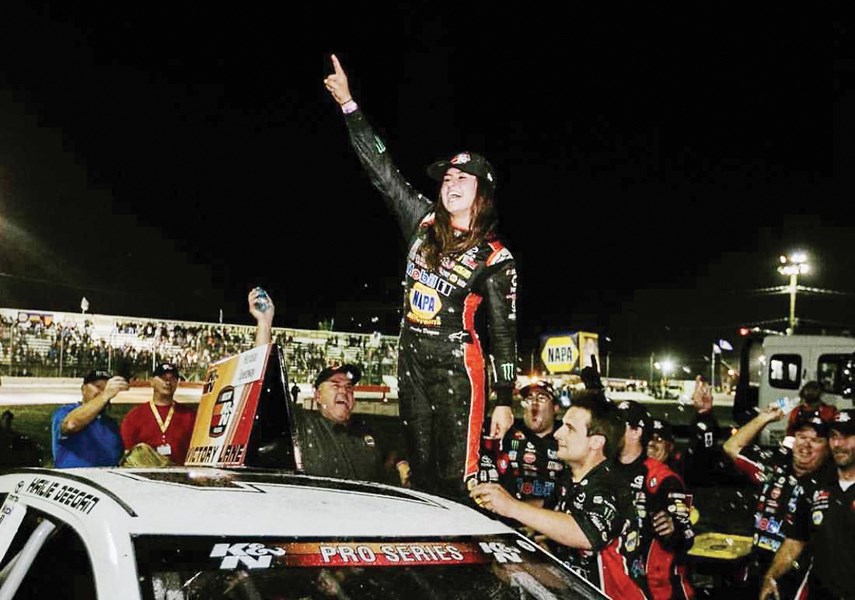In the late 1800s, people had genuine concerns about what would happen if women started driving these newfangled cars.
Why, just as was a real worry on speedy train rides, the uterus might simply fly out of the body!
I wish I was joking. Society really did believe the myth that women’s bodies weren’t meant to endure speed, and that they might melt or be unable to have children after going too fast. As such, women were initially discouraged from driving. Happily, plenty of pioneering women paid no attention to the nay-sayers.
This week, those pioneers might have beamed at the news that a pair of women have achieved historic victories. Hailie Deegan, a 17-year-old from California, became the first woman to win a NASCAR race. At nearly the same time, 21-year-old Spaniard Ana Carrasco clinched the World Supersport 300, becoming the first woman to win a motorcycling world championship.
As the father of two daughters, I couldn’t be more delighted. Wait, motorcycling? I mean terrified.
Actually, I’m delighted for two reasons. First, these two wins prove out the theory that there is no physical reason that women can’t succeed in professional motorsport. Given the correct training and funding, winning is a matter of skill and luck, not gender. You have to be physically strong, and should not have the physique of, for instance, a middle-aged local newspaper columnist. However, racing is more a game of endurance and extreme focus and women can be just as good as men in those regards. Even better in some cases. Hey look, a blue car! What was I talking about?
Oh right. Anyway, Deegan’s textbook bump-and-pass and Carrasco’s heroic battle through the midfielders aren’t just good news for women. They’re good for their sports as a whole. Racing in any series you’d care to name has been suffering a bit from society’s overall decline in attention-spans (lemme quickly go compose a tweet about that sweet blue car), and could use a shot in the arm from a couple of positive stories.
Further, while the wins are historic and hopefully set a precedence, they are not the first time that women have succeeded in the racing sphere. The name that first springs to mind, as a fan of rally, is the ferocious Michèle Mouton.
Mouton competed in the World Rally Championship in the early 1980s, bursting on to the scene with a surprise win at the Rallye Sanremo. At the wheel of her turbocharged Audi Quattro, she took four victories and came a close runner-up in 1982, just behind Walter Röhrl. The usually outspoken Röhrl remarked that he could not have accepted losing to a woman.
More than a few drivers had to. In 1985, Mouton won the German rallying championship handily, winning six of the eight events. She earned the nickname “der schwarze vulkan,” or “the black volcano,” for her raven locks and somewhat incandescent temperament. She also was the fastest driver up Pikes Peak that year, shattering a three-year-old record despite having to drive through a hailstorm.
The performance upset former 1982 record holder Bobby Unser to no end, who was probably additionally unhappy that Mouton was a Frenchwoman driving for a German team on American soil. Mouton retorted, “If you’ve really got (ahem, fortitude) you can race me back down again.”
Who wouldn’t love drama like that? You don’t need to know the technicalities of tire choice or dealing with engine cooling at high altitudes or any of the other engineering aspects of the race. You just need to pick your hero and cheer them on, which is the best part of being a racing fan.
How am I going to share my love of cars and racing with my daughters? Maybe by telling them about Juju Noda, the Japanese driver who currently holds the Formula 4 record at the Okayama International Circuit. She’s 12.
Or maybe we will crack open a copy of By Brooks Too Broad For Leaping and read the words of the legendary racing journalist Denise McLuggage.
Either with stories of the pioneers, or by seeing these new heroes coming up, I’ll be able to pass along some of this passion for automobiles across gender and generation lines. And that’s the thing about automotive enthusiasm: the more the merrier.
Brendan McAleer is a freelance writer and automotive enthusiast. If you have a suggestion for a column, or would be interested in having your car club featured, please contact him at mcaleeronwheels@gmail.com. Follow Brendan on Twitter: @brendan_mcaleer.




